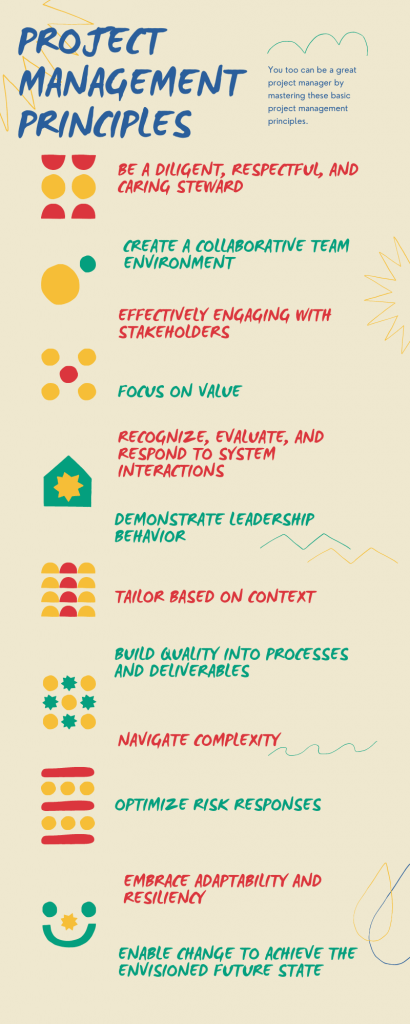Over the years project management has constantly evolved. This has enabled project management professionals to apply the latest techniques while handling projects. The seventh edition of A Guide to the Project Management Body of Knowledge (PMBOK) is instilled with new areas of knowledge. The Project Management Principles element specified in PMBOK 7th edition covers 12 principles. Project managers treat these principles as professional guidelines for managing projects.
Jump ahead to
What are principles?
Depending on the profession, principles can be prescriptive. Some professions treat principles as the law. However, in the project management field, principles are not considered prescriptive. The 12 principles merely play the role of guiding individuals involved in managing projects. According to PMI, global project practitioners from various industries identified the Project Management Principles. These 12 project management principles resulted from multiple feedback rounds given by the practitioners. Let us have a detailed look at the project management principles.
The 12 Project Management Principles:
Be a diligent, respectful, and caring steward:
PMP-certified project managers are required to handle their responsibilities in the internal and external environment of the organization. Within project management, project managers act as stewards to perform their duties with integrity, care, trustworthiness, and compliance.
Create a collaborative team environment:
Based on the type of projects handled, a project team can consist of individuals with varied skill sets. Project management professionals are responsible for creating a suitable environment for diverse individuals working on the project. The factors that contribute to building such an environment include organizational structures, processes involved in the project, and team agreements.
Effectively engaging with stakeholders:
Stakeholders play a crucial role in the success of the project. This necessitates project management professionals to maintain transparency with such individuals. Project managers can interact with such individuals to gain more insights into project handling. Strengthening the relationship with stakeholders benefits organizations and project management professionals in the long run.
Focus on value:
In the project management field, value is considered one indicator that determines project success. This principle emphasizes creating maximum value for clients. Furthermore, project managers and the team give importance to the project’s outcomes rather than deliverables for value creation.
Recognize, evaluate, and respond to system interactions:
This project management principle focuses on how projects have similar characteristics as a system. The team which works on a particular project is required to integrate all the parts of a system to attain the intended outcomes of the project.
Demonstrate leadership behaviour:
Project management professionals must develop and adapt leadership behaviours while managing projects. Being a leader motivates the team and boosts the organization’s project success rate. Developing traits of leadership based on the nature of the project assist the team in thriving and matching the expectation of customers and top management.
Tailor based on context:
Often project managers struggle to handle project-related activities by using the traditional approach. This project management principle talks about how project managers can tailor and customize their approach to suit the needs of a project. This further helps complete the project on time and within the planned budget.
Build quality into processes and deliverables:
Project managers are required to maintain the quality levels of the deliverables according to the requirements set by clients. Organizations set metrics to measure quality levels based on performance, criteria, sustainability satisfaction, and many other factors. However, during delivery, every organization measures quality according to the acceptance criteria and fitness for use.
Navigate complexity:
Every project has a certain set of complexities associated with it. This project management principle emphasizes how the team can look for symptoms of complexities. On identifying these symptoms, the team can decide how they can navigate complexities without harming the smooth flow of the project.
Optimize risk responses:
Various kinds of risks can arise from a project. Project managers must create a risk response strategy based on the exposure. As risks can arise at any point, the team constantly looks out for potential risks that can impact the project delivery. Effective project risk responses can reduce the threshold of risks significantly. A project manager should follow risk management best practices.
Embrace adaptability and resiliency:
Projects face uncertainties during every phase of the project lifecycle. Building the traits of adaptability and resiliency within the project team helps to achieve the desired outcomes. Furthermore, these traits assist in recovering from project failure quickly and working towards creating value.
Enable change to achieve the envisioned future state:
Change is inevitable even while handling project tasks. This project management principle focuses on developing a change structure that will facilitate a smooth transition. There can be various obstacles when an organization is willing to embrace change. As a result, change management should be enabled in organizations to achieve project success.
Conclusion:
Project Management Principles play a crucial role in project management. Project Management Professionals (PMPs) master these principles before handling projects efficiently and managing a project team during PMP Certification Training. Furthermore, organizations benefit from hiring PMP-certified professionals as they assist in achieving the desired project success rate.




